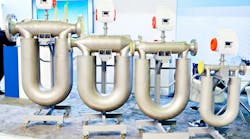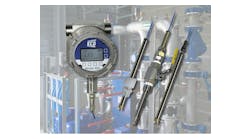The measurement of mass flow is important to many processes, but the term "mass flowmeter" is often used liberally. Flowmeter specifications apparently use the term "mass flowmeter" to refer to devices that measure the mass flow of a fluid stream. Many suppliers claim that their flowmeters are mass flowmeters. Which of the following are mass flowmeters?
A. Coriolis flowmeter
B. Differential-pressure flowmeter
C. Differential-pressure flowmeter with flow computer
D. Thermal flowmeter
E. Ultrasonic flowmeter
F. Vortex-shedding flowmeter
Commentary
Coriolis mass flowmeters (Answer A) vibrate the fluid while it is moving through the flowmeter to create acceleration. The force created as a result of the acceleration is proportional to the mass flow of the fluid. Therefore, this technology uses the properties of mass to measure mass flow and should be considered a mass flowmeter.
Differential-pressure flowmeters (Answer B) present a restriction to the flow that creates a differential pressure. The volumetric flowrate can be inferred from the differential pressure. Mass measurements can be inferred from the volumetric flowrate and provide reasonable mass flow performance in some applications when fluid properties are well known and when operating conditions are well defined. Even though an inferred flow measurement may be expressed in mass units, differential-pressure flowmeters are inferential flowmeters.
Adding a flow computer to a differential-pressure flowmeter (Answer C) allows compensation for the operating pressure, operating temperature, and other parameters. The volumetric flowrate is still inferred from the differential pressure, and flow is often expressed in mass flow units. Mass flow measurement performance is typically better than for differential-pressure flowmeters because the flow computer compensates for actual operating conditions. Even though an inferred flow measurement may be expressed in mass units, differential-pressure flowmeters with flow computers are inferential flowmeters.
Thermal flowmeters (Answer D) utilize thermal properties of the fluid to measure flow where the thermal properties of the fluid are nearly constant, even when the operating pressure and operating temperature varies. These flowmeters are often considered to be mass flowmeters, however they do not measure mass per se, and fluid composition changes and varying thermal properties typically affect their performance.
Ultrasonic flowmeters (Answer E) and vortex-shedding flowmeters (Answer F) measure the velocity of the fluid, from which the volumetric and mass flow can be inferred. Some designs have integral flow computers that improve performance by compensating for operating pressure, operating temperature, and other parameters. Even though an inferred flow measurement may be expressed in mass units, ultrasonic and vortex-shedding flowmeters measure velocity and infer mass flow.
Additional Complicating Factors
When fluid properties are not well defined, the relationship between the raw flow measurement and the inferred mass flow can be altered. Therefore, the mass flow performance of inferential flowmeters and flowmeters that measure velocity can be degraded.
Some articles about mass flowmeters do not specifically define which flowmeters are considered "mass flowmeters," so you may have to contact the author of the article for clarification.
David W. Spitzer, P.E., is a regular contributor to Flow Control. He has more than 25 years of experience in specifying, building, installing, startup, and troubleshooting process control instrumentation. He has developed and taught seminars for almost 20 years and is a member of ISA and belongs to ASME, MFC, and ISO TC30 committees. Mr. Spitzer has published a number of books concerning the application and use of fluid handling technology, including the popular The Consumer Guide to… series, which compares flowmeters by supplier. Mr. Spitzer is currently a principal in Spitzer and Boyes LLC, offering engineering, product development, marketing, and distribution consulting for manufacturing and automation companies. He can be reached at [email protected] or 845 623-1830.
www.spitzerandboyes.com

